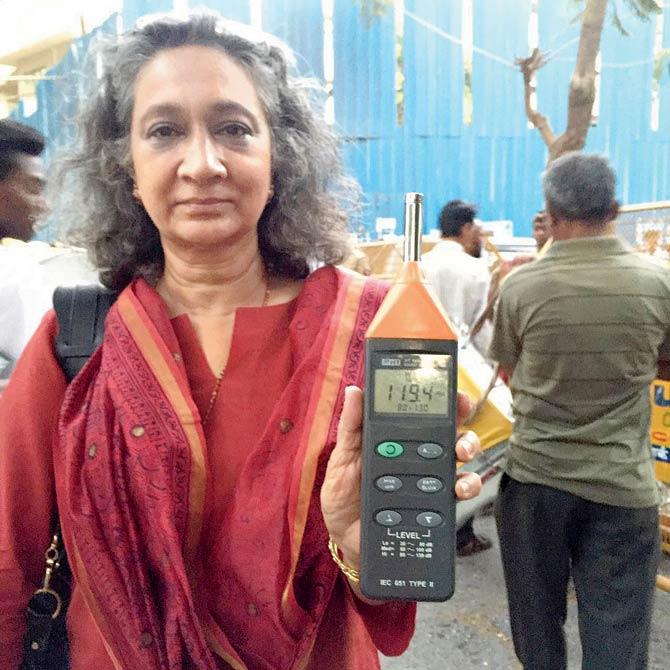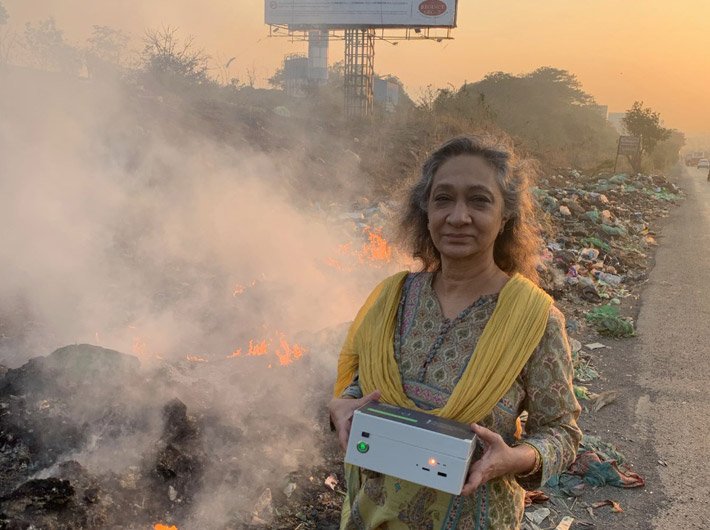Sumaira Abdulali is an eminent environmentalist, renowned for raising voice against under-recognised, severe environmental issues such as noise pollution and sand mining. Despite Mumbai being one of the noisiest cities in the world, Abdulali faced a great number of challenges in highlighting the health hazards posed by noise pollution.
She also brought to light the issue of illegal sand mining which worsens the effects of climate change. “Twenty years ago, people laughed when I spoke of the ill effects of noise pollution. Your ideas are elitist, they said. Indians love noise. Since then, First Information Reports filed by the Police on noise pollution under the Environment Protection Act have become the second highest (after wildlife) environmental crime in Maharashtra,” says Abdulali.
Her efforts to reduce noise pollution have been constant and meticulous. Abdulali is often spotted walking around the city with an audiometer in her hand during festivals when the noise levels rise excessively, causing serious distress, particularly to the elderly and the sick.

Through numerous public campaigns, documentaries, television debates, press articles and legal interventions, Abdulali has remained undeterred even after being attached by the sand mafia in 2004, and went on to build India’s first activist protection network. She has been named the Indian ‘Minister of Noise’ by the press and government officers.
She founded a public trust, Awaaz Foundation, to aid her campaign against noise pollution. She held up the campaign through awareness programs, litigation, and advocacy programs with the help of volunteers as well as legal professionals.
Abdulali’s recommendations regarding appropriate noise level restrictions on sirens and horns were notified as law by the State government. She also fought against the noise caused by the Mumbai Metro construction and worked in an extensive campaign against honking. As a result of her efforts and noise mapping throughout Maharashtra, the State government put a ban on DJs during the festival season
She filed several petitions through Awaaz Foundation to reduce the noise caused by horns, firecrackers, construction activities, and more, including one in 2007 for a noise map of Mumbai to be included in the city’s development plan. In 2016, the High Court finally passed orders to reduce noise pollution through all the above sources and declared that the implementation of these orders would be impartial, and would thus apply to festivities and celebrations of all religions.
As a result, the only city where the noise level shrunk considerably during the festivals in 2016 was Mumbai. Abdulali has impartially advocated for a strict application of Noise Rules to all religious places. At the annual Dussehra Rally at Shivaji Park, the leader of Shiv Sena, Bal Thackeray, called her the ‘Awaaz lady’ as she strolled about measuring noise levels.
The leader went on to challenge her to control his voice’s decibel levels. As his decibel levels compared to those of the roar of a tiger, the Mumbai police charged the Rally organisers for criminal offences.

In addition to this, she petitioned against the use of private helipads in Mumbai. Though the State government had permitted rooftop helipads on the homes of Mukesh Ambani and Anil Ambani in 2010, Abdulali’s efforts bore fruit as the Ministry of Environment and Forests declared that such helipads are ‘avoidable’ and hence, banned their use throughout India.
Also in 2010, Abdulali requested the Ministry of Environment and Forests (MoEF) stricter Noise Rules and highlighted the need for a national database for noise pollution. The MoEF incorporated all suggestions given by Abdulali and made several alterations in the Noise Rules. This also led to the setting up of a National Noise Monitoring Network of the Central Pollution Control Board in India.
Also read: Kinkri Devi: An Inimitable Voice In Environmental Activism
The Maharashtra state government also banned the use of the phrase “Horn OK Please” on vehicles, saying that it causes noise pollution by encouraging drivers to honk unnecessarily. Addulali has also worked closely with the Maharashtra Pollution Control Board Committee to rectify the noise pollution caused by horns and sirens by determining proper restrictions.
Abdulali’s recommendations regarding appropriate noise level restrictions on sirens and horns were notified as law by the State government. She also fought against the noise caused by the Mumbai Metro construction and worked in an extensive campaign against honking. As a result of her efforts and noise mapping throughout Maharashtra, the State government put a ban on DJs during the festival season.
Abdulali spotted cases of illegal sand mining and went on to document the evidence herself through photos and videos. She was repeatedly threatened, intimidated, and attacked by the sand mafia, including an incident where her car was intentionally hit by a truck. Instead of being frightened, Abdulali joined hands with other activists and NGOs and founded the Movement against Intimidation, Threat and Revenge against Activists (MITRA)
Abdulali is considered to be “India’s foremost campaigner against illegal sand mining” as she fought against illegal sand mining. In 2003, she came across a case of illegal sand mining near her ancestral house in Alibag. Upon her confrontation with the illegal sand miners, she was physically assaulted by the miners.
Following an FIR, the police charged the four individuals who attacked her. In 2006, the Awaaz Foundation appealed against illegal sand mining through public interest litigation. After a lot of investigation and a great many hearings, the Bombay High Court passed orders to ban illegal sand mining in all coastal areas, and eventually banned sand extraction throughout Maharashtra.
Despite these orders, Abdulali spotted cases of illegal sand mining and went on to document the evidence herself through photos and videos. She was repeatedly threatened, intimidated, and attacked by the sand mafia, including an incident where her car was intentionally hit by a truck. Instead of being frightened, Abdulali joined hands with other activists and NGOs and founded the Movement against Intimidation, Threat and Revenge against Activists (MITRA).
Abdulali also took part in the making of the 2012 documentary Sand Wars. The given documentary focused on the issue of sand mining and how it affects the environment across the globe. Following the immense success of the film, Abdulali launched an awareness campaign at Juhu Beach, called “Don’t Bury the Issue of Sand Mining”.

She was awarded with the Spikes Asia Silver Award for “public relations and lobbying” for this campaign. Moreover, she has worked and fought constantly against open-pit mining, and made numerous suggestions about better ways of recycling plastic and other waste in an eco-friendly manner.
Abdulali also participated in the 2004 short film “Is God Deaf?”, dealing with the issues of noise pollution in the name of religion. Her endeavours against environmental issues have been extensive and inspiring. Through innumerable campaigns, awareness programs, advocacy programs, legal interventions, TED talk, and more, Abdulali’s contribution in the field of environmental protection has been immense, to say the least.

